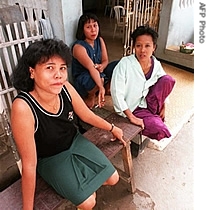2007年VOA标准英语-Indonesia Faces Rising Tide of HIV(在线收听)
Surabaya, Indonesia
12 September 2007
HIV, the virus that causes AIDS, is a growing threat in Asia. The United Nations says nearly a million Asians contract the virus each year. It is spreading fast in Indonesia, where prostitution is a major cause. Trish Anderton visited one organization in Surabaya, East Java, Indonesia, that is trying to slow the spread of HIV AIDS, and finds the work is slow and difficult.
In Indonesia's sex capital of Surabaya, clinic workers chat with a client as they usher her into a small, plain office. The 16 year old girl, who did not want her name to be used, is dressed in tight t-shirt and jeans.
She has been a sex worker for more than a year. Talking with an outreach worker, she recounts the moment she got into the business - when she caught her fiancé having sex with another woman.
"I should have slapped him in the face, but he slapped me instead," she said. "I wanted to slap the girl he was with, but she slapped me instead. So the next morning I ran away."
The girl says she has tried to find other work, but without success. Today she wants to be tested for HIV. She and the outreach worker review the basic facts about how HIV is transmitted. The girl knows she should always have her clients use a condom, but admits she cannot convince them. Even her current boyfriend will not wear a condom.
She says she wants to, but her boyfriend does not, because he says it is less enjoyable.
This inability to dictate the terms of sex is a daily reality for prostitutes in Indonesia, says Esthi Susanti Hudiono, head of Hotline Surabaya - the organization that runs this office.
 |
| Indonesian sex workers at Jakarta's notorious Kramat Tunggak brothel complex wait outside one of the many bars (File) |
Hotline Surabaya runs employment programs to provide alternatives to prostitution and a theater group to help women learn to express themselves. But Esthi says that peer pressure is stronger than individual rights, meaning stronger weapons are needed against HIV. She believes condoms have to be seen as mandatory, and that message has to come from the top down.
"If the elite don't support us, there won't be change," she said. "So the elite of government and the elite of society are important."
Her group successfully lobbied for a local regulation in 2004 requiring that customers of sex workers use condoms. But this has so far remained a largely symbolic victory, because the law is not enforced.
An estimated seven to 10 million men visit commercial sex workers each year in Indonesia. Many have not been educated about the dangers of HIV. According to the United Nations, prevention efforts in 2004 reached about 18 percent of female sex workers and less than seven percent of their clients.
There are some signs of progress, however. Data suggest the level of knowledge about HIV is improving among both prostitutes and their partners.
While it tries to combat the rising tide of infections, Hotline Surabaya is also working to prevent today's children from becoming tomorrow's sex workers.
At a sparsely furnished office in one of Surabaya's red light districts, volunteers teach kids from the neighborhood, including children of sex workers.
Prostitutes' children often dislike going to school because fellow students and even teachers ostracize them. Many are not allowed to enroll in school at all, because they do not have birth certificates.
Program manager Joris Lato and his staff talk to the parents and try to convince them to educate their children and respect their rights.
Joris says many parents exploit their own children. They send them out to sing and beg in the streets. When they get older, the transition to prostitution is easy.
Indonesia's economy is improving, but its poverty level remains high, with nearly half the population living on $2.00 a day or less. The poor have limited access to education, health care and shelter.
Until that changes, groups such as Hotline Surabaya are not likely to have much influence on national statistics. But they may help individuals - such as the 16-year old prostitute - to improve their chances of survival.